A 42% of companies allocate part of their budget to MarTech

The martech (technological marketing) sector has reached a turning point for brands and agencies around the world. It is a global market of 100 billion dollars and with forecasts of growth.
Companies in the North American and UK areas have increased martech budgets by 44% in the past year.
Growth is information, and more specifically, the understanding of marketers that data expertise leads to actionable insights that generate greater ROI and provide more control.
Budgets and the market
Companies in North America and the UK are spending 23% of their budgets on martech, compared to 16% last year.
The results of the research conducted by Moore Stephens suggest that, in the last year, companies in the named areas have updated in terms of spending on martech, in addition to implementing new tools and functions within the company.
Compared to the inaugural market size last year, the results reveal an industry with a long way to go. This growth is forecast to continue, thanks to increased investment and the incorporation of tools over the next 12 months.
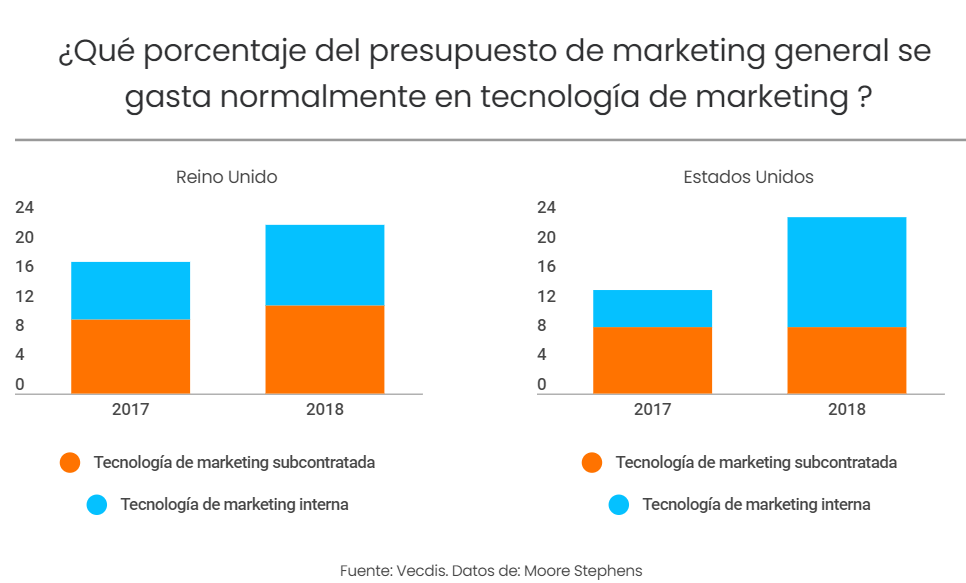
Companies are convinced of the importance of excellence in customer experiences, and are therefore willing to maintain a series of strategies, internal marketing, that make these experiences much closer.
According to a MarketingProfs report in 2016, it was expected that 62% of North American marketing specialists could conduct martech campaigns, and by the end of 2017, ANA announced that 35% of the programmatic marketing companies had already adapted.
This trend is reflected in the survey results. In North America, 66% of the marketing department’s budgets went to martech. Figure to 47% in the UK.
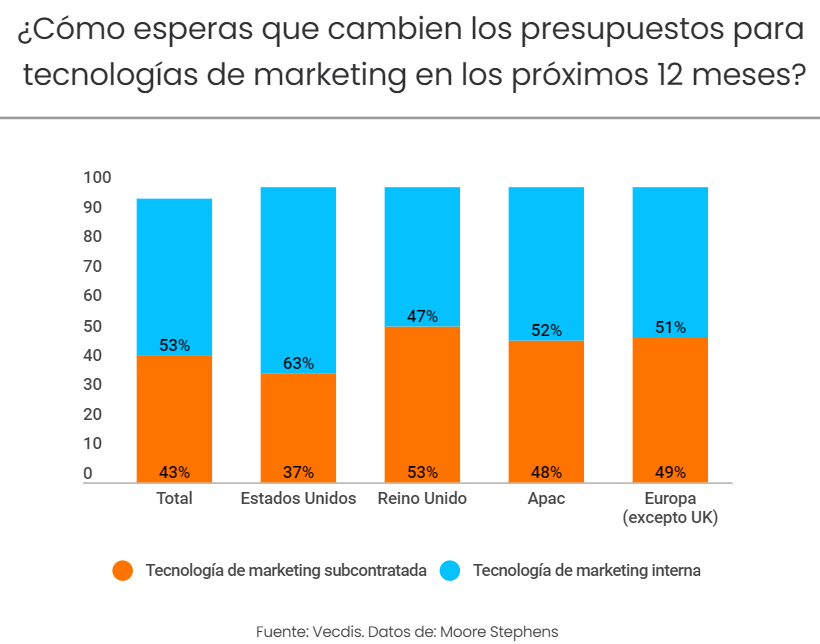
Budgets are expected to increase in the next 12 months. This is particularly the case in Europe (excluding the United Kingdom), where 63% of the brands expected their budgets to increase. However, in the case of the United Kingdom there is the same likelihood of maintaining budgets or increasing them (49%).
Globally, for those expecting an increase in budgets, it is predicted that an average increase of 13% over the next year, with nearly 20% in North America and the UK, expecting increases of more than 25% in their martech budgets by the end of next year.
This increase in investment will make companies increasingly control the situation and are able to improve their commercialization and gradual automation thanks to novel technologies.
On the other hand, a recent CIO survey found that 42% of the marketing professionals claim that their department currently has a specific budget to invest in technology products and services.
The risk for marketers is that the continued adoption of new technologies in the quest to increase efficiency and achieve full automation, it can lead to the accumulation of a series of technologies so complex that the passage of time will cause the efficiency when using those tools to decrease.
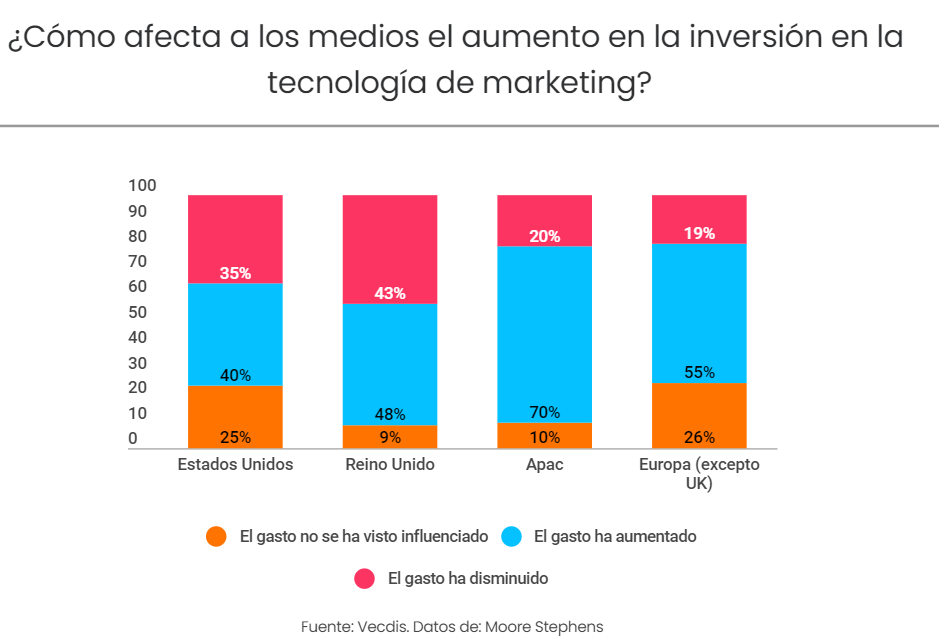
This increased investment in martech is impacting on average brand spending, depending on the regions. In the UK, 43% believes that spending has increased as a result of increased investment in technology. Compared to only the 19% in in the rest of Europe who feel the same.
The results indicate that an increase in martech spending could actually increase efficiency, thus helping marketers understand where it is best to spend their budget.
What slows more investment?
As with most investment decisions, the main barrier to further investment remains the budget, according to 43% brands.
Investment in new technologies cannot continue indefinitely for the vast majority of companies, as each new implementation leads to integration problems and greater difficulty in training employees.
The lack of understanding of the technology and data collected is also recognized as drawbacks to investment in martech. Disjointed or poor quality data, on the other hand, creates the need for companies to try to get their customers to provide understandable and specific information.
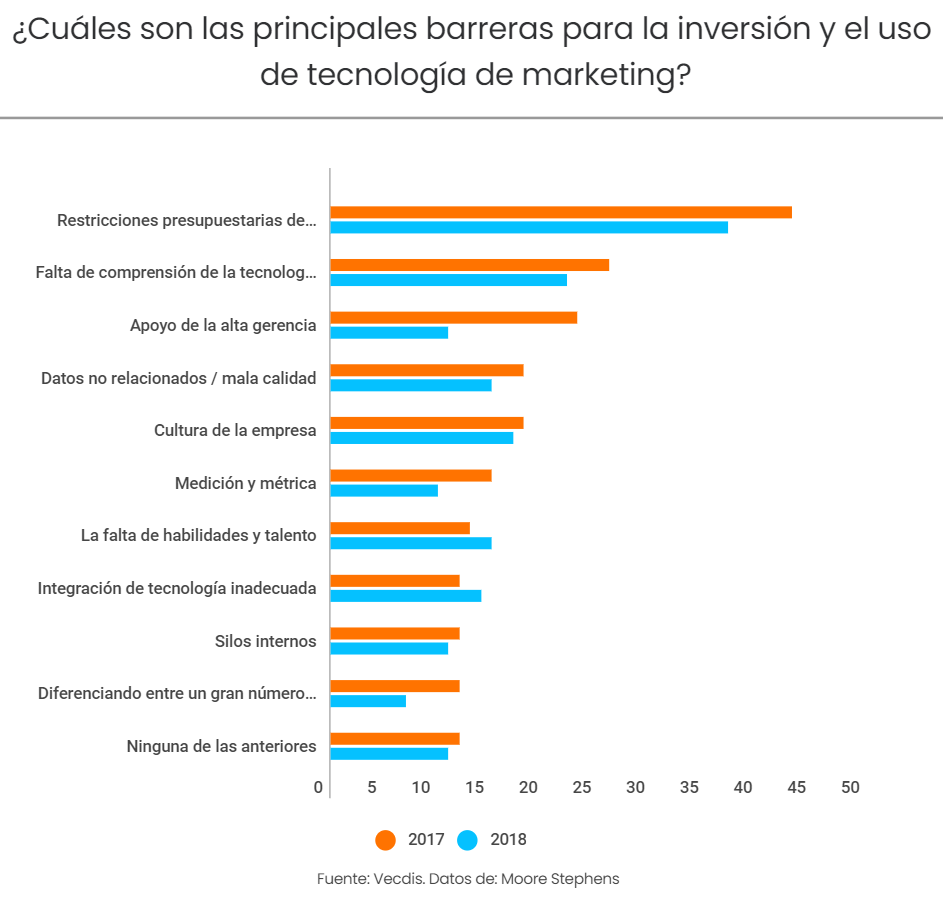
In the case of marketing agencies, they identify the complexity of technology as the biggest barrier for their customers. Followed by investing more in martech, above budgetary constraints.
What does Europe think?
Marketing professionals in Europe are the least confident in the use of this marketing sector. Nearly half (46%) feel they don’t have all the tools they need.
The traditional culture of companies also seems to be one of the main drawbacks to investing more in this type of marketing. However, 63% of the companies intend to invest more in the future.
Globally, creativity and data analysis were selected as the best skills when hiring marketing staff. In Europe, neither of these requirements were in the top two, on the other hand, if it is assessed that the employee fits the brand strategy, that he is able to convert data into actionable information and that takes into account the customer experience. With more than 40% of Europe’s marketers, they use personalization to optimize the customer experience.
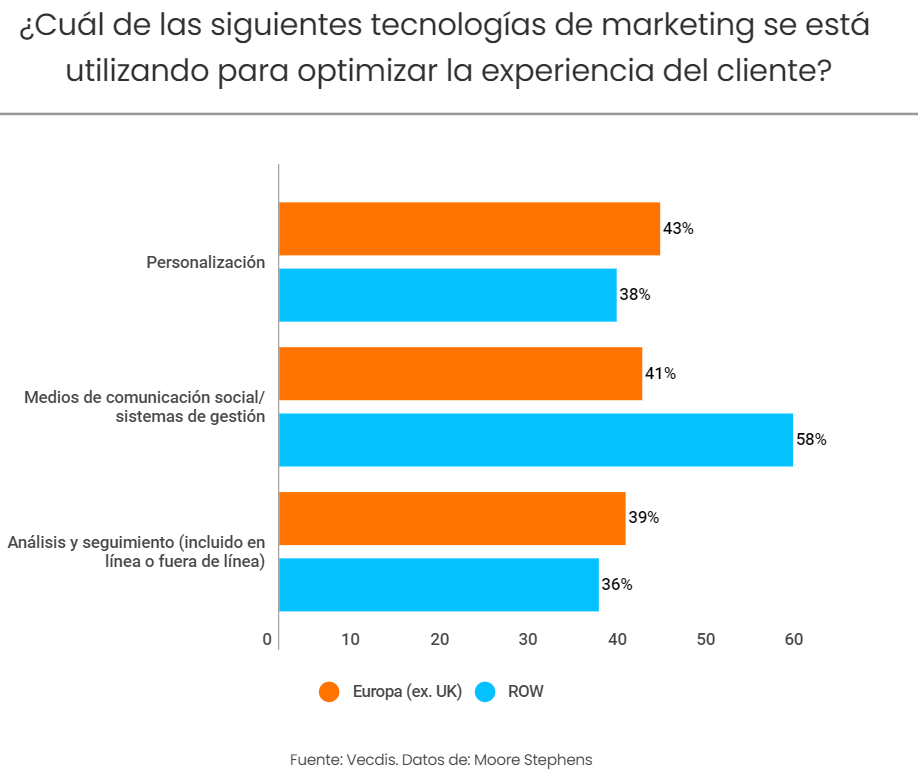
Regarding the new technologies used by European marketing managers, the 40% uses IoT devices, and also has them integrated into its marketing strategy. Artificial intelligence and bots are currently not as used, however, 35% of the workers in the sector plan to integrate them into their activities in the next 12 months.
Perhaps the emergence of GDPR has led to data-feed technologies being prominent in technologies not planned for use in the near-future fenced, especially biometrics (53%) and facial recognition (55%).
It should be noted that, although automation is prominent among the most interesting options (22%) for brands, agencies do not have the same view which perhaps further demonstrates the gap between brands and agencies, around understanding and use of martech.
However, for both brands and agencies, the importance of tracking customers across devices and channels is evident. Both aspects see an opportunity in customer monitoring over the next three years.
Martech’s skills
The creativity and effectiveness of the data obtained are the most valued characteristics of martech. In general, skill sets are preferred over specific skills.
However, the main priority for agencies is different, 65% of them believes that martech’s most valuable skill is to turn customer information into useful data.
In fact, most brands and agencies have encountered the need to hire staff with data analysis skills associated with their use in martech. However, only 62% of the companies feel that their workers have the skills to capitalize on their investment in martech.
Martech and customer experience
Customer experience (CX) has firmly established itself as the number one prospect for marketing professionals who want to retain and grow their customer base.
In an era of greater competition in almost every industry, the CX is what sets leaders apart from the rest. That’s why more than 50% of the world’s professionals have named CX optimization as very important and high priority.
With CX as the primary focus for businesses, the primary goal of marketing technology investment must be to improve the CX in some way, either directly or indirectly, through technological tools that allow greater efficiency.
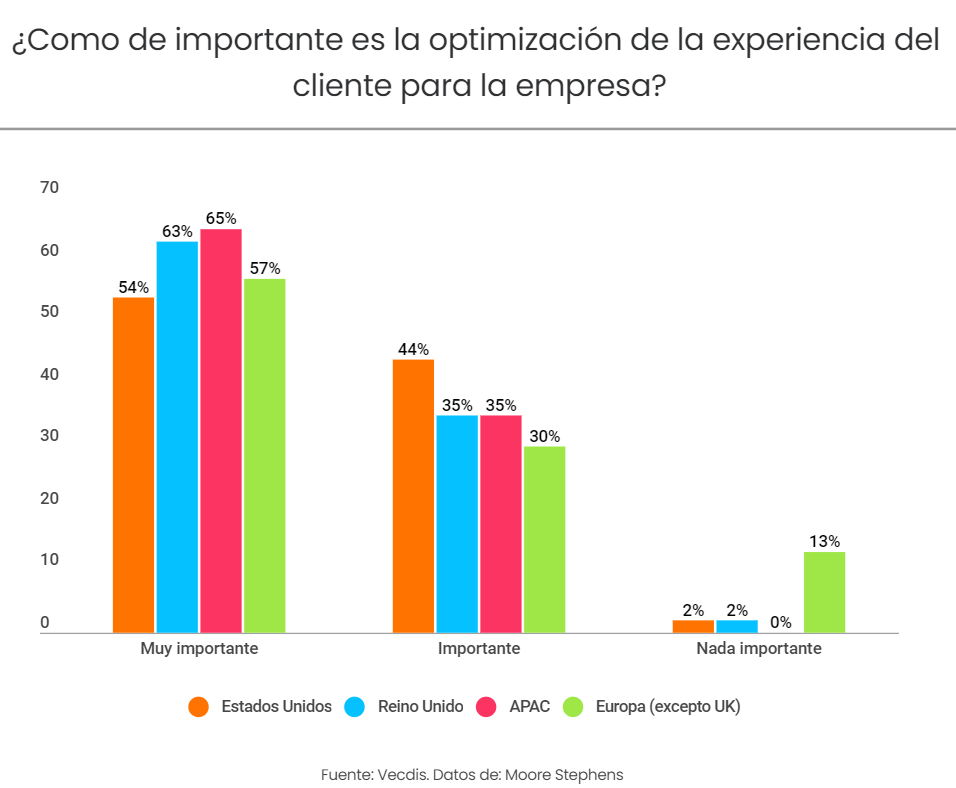
Despite the investment in technology, any integration issues of different specialized tools can hinder improvements in the customer experience, and can even be detrimental.
Therefore, 49% of the professionals are already using a tool to optimize the experience and the 27% are planning to use one in the next 12 months.
On the other hand, by comparing the results of North America and the United Kingdom, it is clear that social media and management systems have increased in use compared to previous years, perhaps somewhat surprising given the increase in consumer privacy concerns.
CRM technologies remain a superior tool to optimize the customer experience, increasing from 43% to 47%, and the use of data management platforms (MPPs) has also increased.
MPPs enable marketers to consolidate data obtained from multiple sources. Leveraging data is a priority part of brands and agencies, along with the importance of analytics and tracking.
The future of Martech
Today technology develops so fast that companies do not get to be able to implement all the innovations. Still, 45% of the brands are currently using novel and disruptive technologies such as IoT.
On the other hand, voice devices have undergone rapid development over the past year, influencing the way online searches are conducted and driving progress in areas such as asset optimization.
Looking forward, brands are still excited about automation. Much of the martech industry focuses on a general automation goal, initiating this digitization in parts of the marketing process to improve efficiency, and that can be seen in that 29% of the brands see this as the most exciting opportunity in the next three years.


